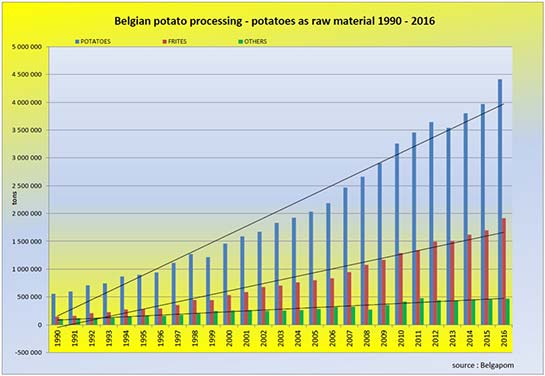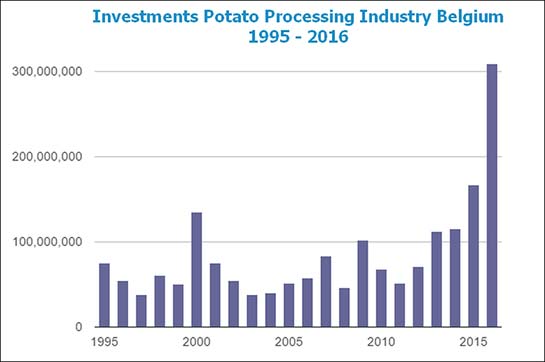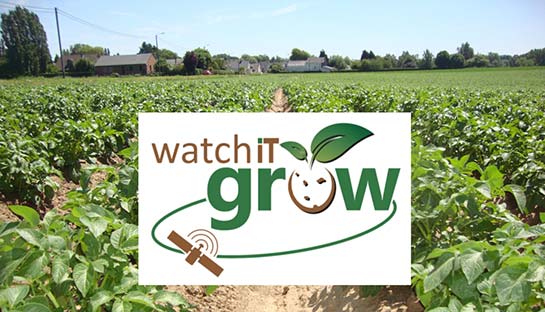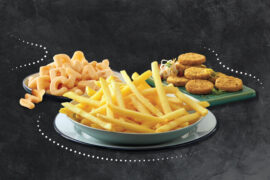The Belgian potato processing industry scored a record year in 2016, reports Belgapom, the Berlare-based trade association that represents the nation’s value-added potato packers and traders. Approximately 4.4 million tons of tubers were processed, an increase of 11% compared to 3.97 million tons in 2015.
The sharpest rise was in the output of frozen fries at 1.68 million tons, or + 14.3% compared to output in 2015. The production of non-frozen fries rose 3.5% to 234,700 tons, and other products (crisps, mashed products and flakes, advanced 1.7% to weigh in at 468,513 tons.
The surge in output of frozen fries came as no surprise, as the Belgian potato processing industry exports 80% of its total production and demand abroad has been steadily growing for years.

Sales revenues amounted to €1.55 billion, while the sector provided jobs for 4,115 people – a remarkable increase compared to the 3,537 employees in 2015.
Meanwhile, the highest investment figure since annual investment surveys began in 1995 occurred last year. Approximately €310 million (+ 85% compared to the previous record year) was invested in quantitative and high-quality technical improvements at potato processing plants, of which the majority are family-owned operations.

Sustainable Growth
In 2014, the Belgian potato sector launched a sustainable growth project, whereby in consultation with the entire chain and in collaboration with a number of research institutes, several innovations were started with an eye to the sustainable production of potatoes and potato products. Recently, a tool called “watchITgrow” was introduced to assist producers and buyers in achieving sustainability goals.
Together with the FPS Public Health and the FASFC, various projects to prevent and control organisms harmful to potato growing from doing damage, are underway. At the same time, intensive work continues on other projects such as Bintje Plus and Reskia, which are meant to reduce the use of crop protection products.
A recent update of the BAT study (best available techniques in the area of environmental measures for the AGF sector in Flanders) and the current revision of the BREF study (European BAT) show that Belgian companies are global leaders in this respect too.

Dealing with Threats
However, there are issues facing the potato industry’s growth prospects that must be addressed forthrightly, as protectionist reflexes in many part of the world threaten to throw a wrench in the works.
For example, the Belgian and European potato industry has been confronted with anti-dumping measures taken by the South African and Brazilian governments. The European Commission had shown that while these actions are unwarranted, apparently, it does not have sufficient mandate and resources to intervene adequately in WTO proceedings.
“It therefore seems a priority for the Belgian and European potato chain to be taken seriously as a sector by the authorized departments of the European Commission in order to see its interests more strongly represented,” says Belgapom. “After all, it is a fact that potato production is increasingly evolving from a that of a secondary crop to a main crop for a large number of European farmers.”
Promotion in Southeast Asia
“Small country, great food” is the slogan of the Food.be campaign that aims to simulate the export of Belgian food products.
 A few years ago Belgapom introduced the character James Bint (with a license to fry) as the ambassador of “Belgian fries.” His mission is to propagate the Belgian culture of fries, of which the chip shop or “frituur” is emblematic as a comfort food bastion among Dutch and French-speaking people around the world.
A few years ago Belgapom introduced the character James Bint (with a license to fry) as the ambassador of “Belgian fries.” His mission is to propagate the Belgian culture of fries, of which the chip shop or “frituur” is emblematic as a comfort food bastion among Dutch and French-speaking people around the world.
VLAM (Flemish Promotion Center for Agricultural and Fishery Marketing) will soon start a promotion in Vietnam, Malaysia, Indonesia, Thailand and the Philippines to put Belgian fries on the map in Southeast Asia and part of Oceania. These countries are quite familiar with North American-style “french fries” served by fast food chains. The aim of VLAM’s campaign is to familiarize the growing middle class there with, and the experience of eating “original Belgian fries from the heart of Europe.”
The budget of EUR 3 million, supported by the European Commission and APAQ-W, has been dedicated to the promotion. It will run for three years in collaboration with five Belgian manufacturers of potato products.





